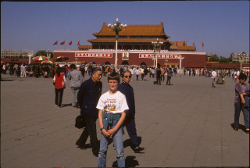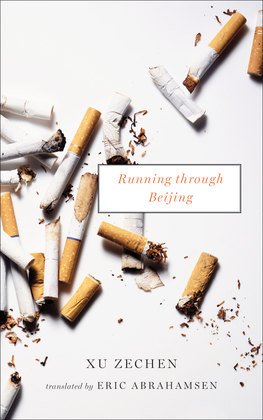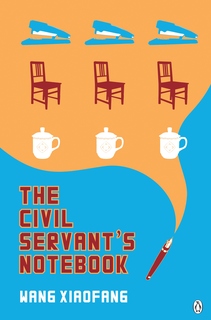Posts
By Eric Abrahamsen, April 13, '16
The big recent news in Chinese children's literature is Cao Wenxuan's winning of the prestigious Hans Christian Andersen Award, sometimes called the "Nobel Prize for Children's Literature". It's a big deal inside China, where the media closely watches the progress of the prize.
Like the Nobel, the prize is given to a writer for their entire oeuvre, not for any book in particular, but despite this everyone still points to works in particular. In this case, that's probably Bronze and Sunflower, translated by Helen Wang and published in the UK last year by Walker Books. In honor of the win, we conducted an email interview with Helen about her views on Cao's works (in case you didn't know, Helen is also one of the editors of Read Paper Republic, and is currently to be found representing PR at the London Book Fair). See below for the full interview.
More…
By Eric Abrahamsen, March 30, '16
Paper Republic is looking for an intern in Beijing to work with us on
literary and publishing events this year, from late spring to early
fall. Think you might be interested? Drop us a line!
What’s going on this year
In addition to our usual activities, Paper Republic is running two
larger events this year, and need more hands on deck. In late June
we’re hosting a publishing fellowship, where publishers and editors
will come from around the world to spend a week in Beijing, getting to
know Chinese writers and publishers. Then in late August is the
Beijing International Book Fair, when we’ll be conducting a small literary festival
as part of the Fair.
Who we’re looking for
We need someone in Beijing with an interest (and preferably
experience) in literature, publishing, and translation. We’re really
hoping to find someone who is strong in both English and Chinese, but
don’t mind what nationality you are. We need someone who’s organized,
motivated and creative, and who thrives on the unexpected.
We need someone who can dedicate at least fifteen hours week to the
job, preferably more, and who can join us at our office in Beijing at
least two days a week.
What you’ll be doing
Helping us plan literary and publishing events, arranging itineraries
and schedules, writing news copy, liaising with publishers and
editors, and picking famous writers up from the airport.
What we can provide you
A fun working environment with entertaining co-workers, a chance to
meet all manner of people, a small monthly stipend, letters of
recommendation, good coffee, and some unique experiences.
What next?
If you think you fit the bill, and are available from around April to
the end of August, get in touch with us at info@paper-republic.org.
We’re looking forward to hearing from you!
By Eric Abrahamsen, February 8, '16
So, following custom in many places on the internet, we thought it
would be nice to do an end-of-the-year what-we’ve-been-up-to
retrospective, now that 2015 is nearly over and 2016 is right… What’s
that? 2015 already over? Not in our neighborhood! As far as we’re
concerned, these are the last days of Yi Wei (乙未), and come Monday
we’ll be entering Bing Shen (丙申), the Year of the Fire Monkey (hence
the excerpt from Journey to the West, aka “Monkey”, that we just
published on Read Paper Republic). None of this newfangled Gregorian
tomfoolery around here. We might consider the Julian calendar… but no.
What have we been up to over the past lunar year? Here’s a brief
rundown:
More…
By Eric Abrahamsen, February 2, '16
Below is the announcement of the Australian Association for Literary Translation (AALITRA) translation prize for 2016, featuring prose and poetry selections from the Chinese. I'll be acting as judge of entries for the A Yi prose bit.
See below for details (keep in mind this is open to Australian citizens only…):
The Australian Association for Literary Translation (AALITRA) now invites entries for the AALITRA Translation Prize.
The AALITRA Translation Prize aims to acknowledge the wealth of
literary translation skills present in the Australian community.
Prizes are awarded for a translation of a selected prose text and for
a translation of a selected poem, with the focus on a different
language each time the prize is offered.
In 2016, the focus language is Chinese. The prose text for translation
is by A Yi (阿乙). The poetry text is by Rong Rong (荣荣). Each text
is available from our
website.
More…
By Eric Abrahamsen, January 29, '16
I'd always assumed that one of the Chinese words for avocado – 鳄梨, or "alligator pear" – was something made up by Chinese wordsmiths who were coming into contact with the funny fruit for the first time. Now, after reading an article on the Washington Post about restaurant menus in the US from a hundred years ago, I learn that "alligator pear" was something made up by… US wordsmiths who were coming into contact with the funny fruit for the first time. Who knew!?
Now can someone tell me the origins of 牛油果?
Edit: And I spelled 鳄 wrong...
By Eric Abrahamsen, January 25, '16
While the rest of us are sleeping, the Paper Republic Science Elves are hard at work updating our database of Chinese authors, books, translations, and publications. We've made a few bits of visible progress recently, to which the Science Elves would like to call to your attention.
The first change is that we've consolidated some of the database pages: it used to be that original Chinese works, their translations, and respective publications of the two, all had their own separate pages in the database. That led to a sort of round-and-round-the-mulberry-bush situation as you clicked from one page to another, and though this amused the Science Elves very much, it was largely unhelpful for the rest of us. This various information is now gathered into more comprehensive pages, where you can see more, while clicking less (for instance see Feng Tang's Beijing Beijing. We've tried to provide redirects for old URLs, so none of your links go broken.
The second change is the introduction of the publications search page, where you can search through publications listed in the database. You can reach this page from the link top and center. For the past few years, we've been compiling lists of "Chinese literature translated and published in 20XX", which has meant quite a bit of manual labor for the people involved. The whole point of having a database, of course, is that you can spit out information automatically, so why not let you do the searching yourself? You can now find publications by year, language, zone, format…
There will be more coming in the future – the database is already quite extensive, and we'll be adding more entry points and search features over the coming months. The Science Elves are dedicated to bringing us into the 1990s, at least, and the 2000s are within reach!
In the meantime, I'll see if I can rouse the Design Elves…
By Eric Abrahamsen, October 13, '15
I'm very nearly late with this, but Diao Dou will be at the Free Word Centre in London today, October 12th, at 7pm, talking about his new collection, Points of Origin, translated by Brendan O'Kane and published by Comma Press.
This link is the place to get all the information about the event – take a look, and attend if you can!
By Eric Abrahamsen, August 24, '15
Congrats to Liu Cixin and Ken Liu, whose joint product volume one of The Three Body Problem just won the 2015 Hugo Award in the novel category. This book just won't stop!
By Eric Abrahamsen, August 20, '15
As Bruce has already noted, Paper Republic is helping the Beijing International Book Fair plan a series of literary events during the book fair in Beijing next week. It's a relatively small affair, but we've had fun with it, and I think have some very nice events on the way.
Do note: These events are aimed at a Chinese-speaking audience, and most will not cater to English-speakers!
You can see the full event schedule, plus our awesome posters (designed by Sun Xiaoxi, about whom more later), at this link.
Events we're particularly excited about include a few with Alan Lee, illustrator of The Lord of the Rings and The Hobbit, a conversation between Enrique Vila-Matas and Ge Fei, a writing workshop with Simon Van Booy, and a discussion about the future of publishing in China with folks from Guoren and Douban. But there's a lot going on in there, check out the link!
Lastly, one event that didn't make it into the official schedule, but which I'm very enthusiastic about, is a talk with author and poet Wang Xiaoni and editor Li Jing, about Wang's short story collection 1966. That's happening Sunday, August 30th, at 3pm, at the One Way Street Aiqinhai location, and shouldn't be missed.
By Eric Abrahamsen, August 5, '15
The Beijing International Book Fair, which takes place annually at the end of August, has always been primarily a publishing event – domestic and international publishing houses trading their wares. This year, with the help of Paper Republic, the BIBF is growing an additional limb: the Literary Salons, a small, reader-focused literary festival taking place alongside the publishing event.
Between August 22nd and 30th, Chinese and international writers will appear in more than a dozen literary events within Beijing, most taking place at the One Way Street Space.
We'll be announcing a full schedule in the next week or so, but expect to see Enrique Vila-Matas in conversation with Ge Fei, Alan Lee discussing his illustrations for The Lord of the Rings, Feng Tang reading poetry, and much more. Stay tuned!
By Eric Abrahamsen, July 15, '15
To translate Nanjing writers!
The Nanjing municipal 文联 is teaming up with the Nanjing Municipal Publishing and Media Group to dump some money on the promotion of Nanjing arts and literature. There are many programs getting funding over the next three years, but one of them is particularly relevant to our interests: they're paying translators who successfully publish translations of works by writers in Nanjing.
Here's the link to the official application instructions.
The rules, as I understand them (and I could be wrong), are:
- You sign a contract with them before the deadline, which is the end of July, 2015, ie fifteen days from the date of this posting.
- Within three years of the signing, you translate and publish either one novel-length work, or two shorter works, by a Nanjing writer.
- They pay you either 180,000 RMB (one novel), or 150,000 RMB (two shorter works). Actually it looks like the fee is disbursed in yearly installments.
- Step four is usually "profit", but that's already happened in step three.
I'm not sure of the exact definition of a "Nanjing writer". I'm also not sure what happens if you translate the novel, and then no one agrees to publish it, which to be honest seems fairly likely. There are a few other terms and conditions, for which see the full explanation at the link above.
Update: I checked with them, and you don't need to have a novel publication contract in place to apply. They will be reviewing the applications, and making decisions based on likelihood of success, and it's enough that you find a publisher within the three-year term of the contract.
What is there to lose, comrades?
By Eric Abrahamsen, June 12, '15
I suspect that some of you out there have, from time to time,
wondered: “but what do you people at Paper Republic actually do all
day long? Surely you can’t survive by snarky literary judgments alone?
Also, can’t you make your website look a little less ’My First HTML’?”
I am here with a resolution to one of your questions, at least: what
we do all day is to get Chinese literature into English, and though
actual readable texts have been in scant supply on the site, that will
change starting a week from today. June 18th we’ll be launching
something called “Read Paper Republic”, where we’ll present one
complete free-to-view short story, essay, or poem on the site itself,
both as a webpage and a download, once a week.
We’ll be kicking off with an original translation of a story by A Yi,
translated by Michelle Deeter. Our editorial team consists of Dave
Haysom here in Beijing and Nicky Harman and Helen Wang in the UK.
More…
By Eric Abrahamsen, May 4, '15
As part of the Best Translated Book Award project, recently announced on the Three Percent site, they're publishing short essays on the various books and the reasons for their nomination. There are four Chinese-language books on the longlist, and I'll update this post with links to the essays as they're posted. As of April 11, we've got:
- Nomination essay by judge Monica Carter on why Qiu Miaojin's Last Words from Montmartre, translated by Ari Larissa Heinrich, should win.
- Nomination essay by ??? on why Hsia Yü's poetry collection Salsa, translated by Steve Bradbury should win.
- Nomination essay by guest critic Christine Palauon why Dorothy Tse's Snow and Shadow, translated by Nicky Harman, should win.
- Nomination essay by ??? on why Can Xue's The Last Lover, translated by Annelise Finegan Wasmoen should win.
By Eric Abrahamsen, March 19, '15
Those of you who are in Beijing: come to the iQiyi cafe next Monday night (March 23rd) at 8pm, for an event with Sun Yisheng, Nicky Harman, Dave Haysom and myself, talking a bit about Pathlight magazine, but mostly about Sun Yisheng's story 《猴者》, and Nicky's translation of it: "Apery". Expect the usual keen textual autopsy, mixed with general literary commentary and snarky asides.
The event is part of the Bookworm Literary Festival, and is 60 RMB. It's taking place at iQiyi, the cafe sort of kitty-corner to the Bookworm that sticks up all by itself, you know the one.
By Eric Abrahamsen, March 19, '15
Each year the London Book Fair hands out awards in a number of categories as part of its International Excellence Awards program. We're pleased to announce that Paper Republic has made the shortlist for this year's International Literary Translation Initiative Award. This is a wonderful bit of recognition, and many thanks to all who made it happen.
The short list is short: besides us it's Asymptote and the Dutch Foundation for Literature, so we're in excellent company.




